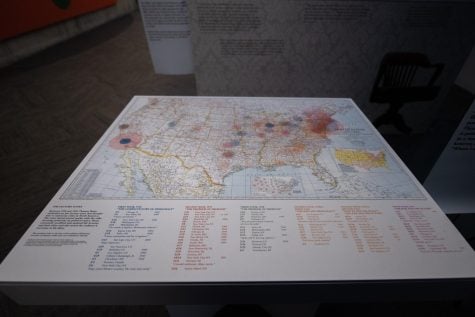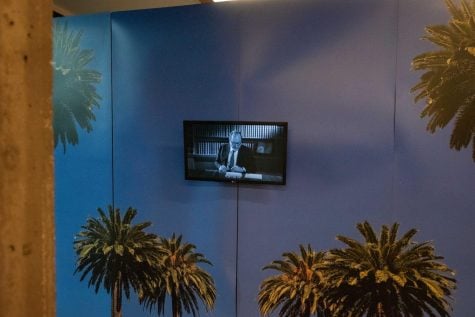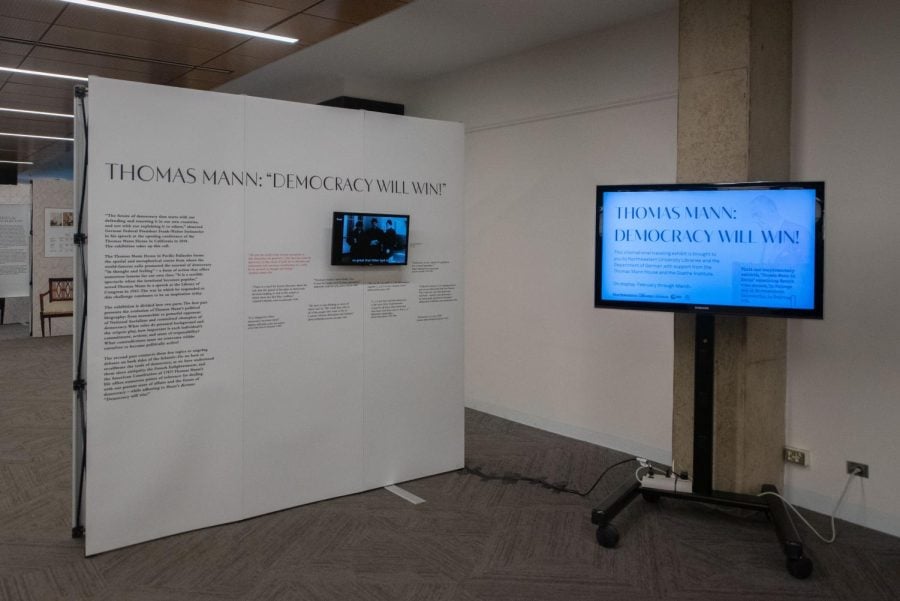University Library exhibit celebrates democracy advocate and author Thomas Mann
Pavan Acharya/Daily Senior Staffer
German Prof. Peter Fenves said Mann’s opposition to fascism in Germany was ironic, since he believed monarchical or autocratic systems best supported the ability of artists to create unique works.
March 3, 2023
In March 1938, novelist and author Thomas Mann — exiled from his home country Germany — visited Northwestern as the first stop of a nationwide lecture tour about the dangers of fascism, calling for military action against Adolf Hitler.
Today, Mann’s likeness has returned to campus as a pop-up exhibit called “Thomas Mann: ‘Democracy Will Win!’” on the ground floor of University Library. The exhibit, which includes written and visual aids, highlights Mann’s lecture circuit throughout the U.S. in the 1930s and 1940s and connects his tour to modern-day politics in Europe and the U.S.
“We’re really excited to have a really important writer of the 20th century and reflect on where the writer might stand in relationship to contemporary political movements and directions,” German Prof. Peter Fenves said.

Fenves said he coordinated with the Department of German and Goethe-Institut Chicago to bring the exhibit — which was originally curated in Berlin — to Evanston. He added that Northwestern University Libraries was also instrumental in bringing the exhibit, which had previously been in states across the U.S. like New York and Georgia.
Fenves was personally interested in bringing a Mann-focused exhibit to NU. He said when he arrived at the University more than 30 years ago, the Department of German still had the “aura of Thomas Mann’s presence.”
“I heard various stories about Mann’s visit to Northwestern,” Fenves said. “My thought was, we should do everything we can (to bring) the exhibit here … so that I would have a chance to track down these stories.”
However, Fenves said Mann’s opposition to fascism in Germany was ironic, since he believed artists could only achieve “culture” in a monarchical or autocratic system. He said Mann could have been an influential Nazi writer but made the choice not to be and was exiled as a result.
However, Mann’s influence in the U.S. extends beyond the pop-up exhibit. The Thomas Mann House in Los Angeles, which aims to be a space for transatlantic debate, operates the exhibit in the U.S., according to Program Director Benno Herz. Mann and his family originally lived in the home from 1942 to 1952.

Herz said the location also runs a residency program that invites academics, journalists and writers to debate fundamental global issues, as Mann did.
“(Mann) was actually like a social activist before social media,” Herz said.
NU’s Department of German has also hosted film screenings of adaptations of works by Thomas Mann and his son in conjunction with the University Library exhibit.
German Prof. Ingrid Zeller, one of the coordinators of the “Mann at the Movies” events, said Mann had a strong insight into the psychology of artists and intellectuals, which manifests itself in the showcased films.
“I think film is such an important media,” she said. “I think it brings the works closer, and it also emphasizes the global impact Thomas Mann had.”
Fenves also said it is likely that most students entering University Library may have never heard of Mann, since he is not widely considered a “great political thinker.”
However, Fenves said he hopes students are exposed to Mann’s writings and understand the sacrifices he made to oppose fascism.
“What you see in Thomas Mann is someone taking a stand and having the possibility of losing a lot to take that stand,” Fenves said.
Email: [email protected]
Twitter: @PavanAcharya02
Related Stories:
— Libraries’ book displays introduce students to new concepts and areas of literature
— Northwestern University Library Workers Union seeks recognition
— University Library hosts new exhibit on alumna-turned-famous actress


